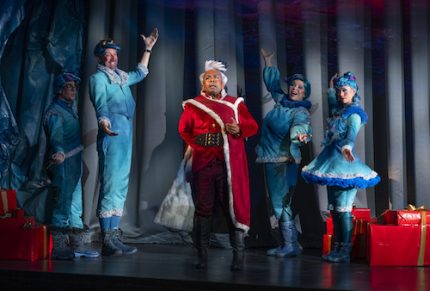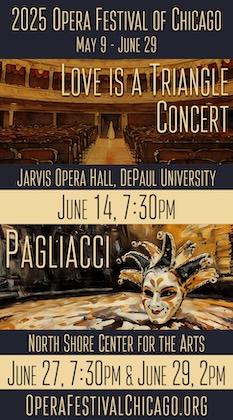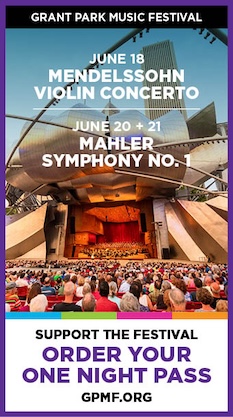COT spikes the holiday brew with a delightful “Becoming Santa Claus”

With a plot just begging for a Pixar adaptation, Chicago Opera Theater’s new production of Mark Adamo’s 2015 opera Becoming Santa Claus made for delightful, albeit unusual, holiday fare.
The opera, whose complex score and clever libretto were both written by Adamo, follows an imagined origin story of Santa Claus that obliquely intersects with that of the nativity to tell a moralistic tale about gift-giving.
Prince Claus is a spoiled, petulant child whose absent father, the King of an elfin land, gives him lavish gifts instead of showing up. Claus grows more embittered with each successive disappointment, leading his sorceress mother to cast a spell banishing the King until the boy’s behavior changes. On the Prince’s 13th birthday, his uncles (the three kings) forgo his party to instead follow a star to bring presents of gold, frankincense, and myrrh to a baby who is supposed to “change the world forever.”
In a jealous rage, Claus orders his elf-servants, Ib, Yan, Yab, and Ob, to create the best toys ever imagined, which he will deliver to this baby in an effort to one-up his uncles’ lame gifts. By the time Claus and his elves arrive in Bethlehem, the mother and child have already left and cannot receive Claus’ fantastical gifts. Claus admits the motivation behind his act of giving was not generosity, but spite, and realizes that what he truly craves is not material things, but his father’s affection. Having learned his lesson, Claus breaks the spell and his father returns.
Though the subject matter of the opera is child-centric, Adamo’s dense and vocally challenging score is anything but. Decidedly contemporary and less melodic than Adamo’s most famous debut opera, Little Women, the score makes liberal use of large vocal leaps, rapid-fire text, neo-baroque melismatic lines for the Prince and Queen, and stratospheric tessitura for one of the elves. If anyone hoped this opera would be a natural successor to Menotti’s Amahl and the Night Visitors, the vocal demands bars it from being practical for younger singers.
The most interesting aspect of the orchestration is the use of two pianos tuned a quarter tone apart. Fortunately, the pianos are only played simultaneously at a few key moments, creating an otherworldly, hair-raising effect. Another memorable feature is the use of a bell choir at the end, played expertly here by a handful of young players from the balcony, which is the only time in which the music seems particularly “Christmassy.”
Assistant conductor Eli Chen made his COT debut, filling in last minute for music director Lidiya Yankovskaya at Friday night’s performance. Chen’s leadership was assured and the ensemble between the pit and the stage was tight, with only a few moments in which the orchestra overwhelmed the singers.
The production, directed and choreographed by Kyle Lang with sets by Steven Kemp and lighting and projections by Driscoll Otto, was visually stunning. The tactful use of projected animations was brilliant and elicited genuine hearty laughter when one animation depicted the reindeer going through a TSA screening machine.
The costumes, designed by Brenda Winstead, were gorgeous, especially the Queen’s diaphanous gowns. Claus’s transformation from petulant child into Santa Claus with the gradual addition of more red elements to his costume was also clever, and the elves, jauntily clad in aqua from head to toe, looked like they’d sprung from the pages of a Dr. Seuss book.
Central to the evening’s success were the excellent vocal and dramatic performances of the cast.
Tenor Martin Bakari led the cast as Prince Claus, his golden-hued, springy tenor and snappy diction perfectly capturing the petulance of the boy. Particularly impressive was how he negotiated the rapid coloratura and large vocal leaps (which included surprising moments of falsetto). In the end, once Claus realizes what it means to be truly generous, Bakari let the spikiness of his tone fall away and brought an easy lyricism to his final aria—the most melodic part of the score.
In the role of Queen Sophine was mezzo-soprano Nina Yoshida Nelsen. Her rich and commanding voice was well suited to the role of the statuesque queen, who is equal parts icy and vulnerable. Of particular note was her heartfelt aria in which she explains her reasoning behind sending Claus’ father away.
The true pillars of the opera, however, were the four elves, played by mezzo-soprano Leah Dexter, soprano Amy Owens, tenor Justin Berkowitz, and bass Matt Boehler, all of whom were on stage throughout the entire 90-minute opera. Their crystalline diction, precise comedic timing, and vocal assuredness in the face of unusual harmonies and rapid-fire syllabic text propelled this production to success.
Dexter was a commanding force both vocally and dramatically, while Owens’ impossibly high soprano was charming and awe-inspiring as she threw out high E’s like it was nothing. Berkowitz was a comedic delight, and Boehler’s quasi-rapped patter aria was brilliantly executed and a highlight of the show. Rounding out the cast was bass David Salsbery Fry as the noble-voiced donkey/messenger. His deadpan performance and rich low notes provided an amusing contrast to his silly costume.
Becoming Santa Claus will be repeated 3 p.m. Sunday at the Studebaker Theater. chicagooperatheater.org
Posted in Uncategorized


